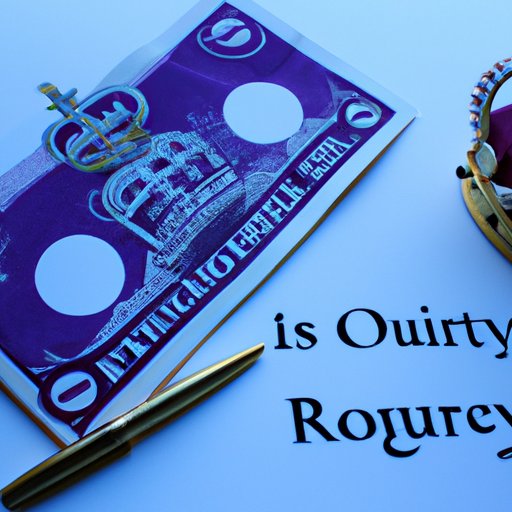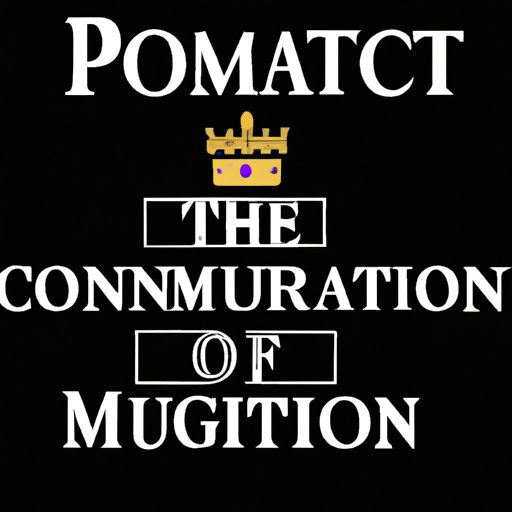Introduction
A monarchy is a system of government in which a hereditary head of state rules as an absolute sovereign. The term is derived from the Greek “mono” (one) and “archein” (rule). Monarchs rule by divine right and are usually the head of state, head of government, and commander-in-chief of their nation’s armed forces. This article will provide an overview of how does a monarchy work, from its historical roots to the powers and responsibilities of a monarch, their role in government, the succession process, the economic, political and social impacts, and how it is financed.

A Brief History of Monarchy
The concept of monarchy has been around since ancient times. It was first recorded in Mesopotamia around 2400 B.C., where kings were believed to have divine authority. As time progressed, monarchs began to be seen as political leaders and the concept of divine right was replaced with the notion of hereditary succession. By the Middle Ages, monarchies had become the most common form of government in Europe.
During the Age of Enlightenment, many European countries began to move away from absolute monarchies and towards constitutional ones. This period saw the rise of parliaments and the emergence of democratic principles. However, some countries still retain their absolute monarchies such as Saudi Arabia, Qatar, Brunei and Morocco.

Understanding the Powers and Responsibilities of a Monarch
Monarchs typically possess three types of power: legal, executive and diplomatic. Legal power refers to the ability to create, change and dissolve laws. Executive power involves the execution of laws and the administration of government. Diplomatic power is the ability to conduct diplomatic relations with other nations. In addition to these powers, monarchs also have certain responsibilities such as protecting their people, maintaining the law and upholding justice.
In some countries, the monarch may also serve as the head of the church. In this capacity, they are responsible for appointing bishops and other religious officials. They may also be expected to perform ceremonial functions such as opening parliament, bestowing honours and attending state funerals.
Exploring the Role of a Monarch in Government
Monarchs play both formal and informal roles in government. Formally, they are the ultimate authority in their country and their decisions must be obeyed. They are also responsible for appointing the prime minister and other ministers. In some cases, they may even have the power to dismiss them. In addition, they may be asked to give assent to bills passed by parliament before they can become law.
Informally, monarchs are important symbols of national unity and identity. They often act as figureheads who represent their country both domestically and internationally. They are expected to uphold traditional values and act as role models for their people.
Examining the Succession Process for a Monarchy
Succession is the process by which a monarch is chosen to succeed another upon their death or abdication. Different countries have different rules for succession, but the most common is primogeniture, which favours the eldest child of the monarch. Other forms of succession include agnatic primogeniture, which favours males over females, and salic law, which prohibits females from succeeding.
In some countries, the monarch may choose their successor. This is known as elective monarchy and is used in countries such as Liechtenstein and the Vatican City. In other countries, the monarch’s successor may be decided by the parliament or other legislative body.
Analyzing the Impact of Monarchy on Society
Monarchies have had a significant impact on both the economic and political life of their countries. Economically, they have often been used to legitimize and stabilize the economy. Politically, monarchies have provided stability and continuity, helping to ensure that governments remain in power for long periods of time.
Monarchies have also had a major effect on society. They have been credited with promoting national pride and loyalty, providing a sense of identity and purpose, and inspiring citizens to take part in civic activities.

Investigating How Monarchy is Financed
Monarchies are generally funded through a combination of public funds, private funds and investments. Public funds come from taxes, while private funds are usually inherited wealth or income from land owned by the monarch. Investments may include stocks, bonds, real estate and other assets.
Some countries may also provide additional funding for their monarchs. For example, in the United Kingdom, the Sovereign Grant is a sum of money paid by the government each year to cover the official expenses of the monarchy.
Conclusion
This article has explored how does a monarchy work, from its historical origins and development, the powers and responsibilities of a monarch, their role in government, the succession process, the economic, political and social impacts, and how it is financed. It is clear that monarchies have played an important role in shaping the world we live in today and will continue to do so into the future.
(Note: Is this article not meeting your expectations? Do you have knowledge or insights to share? Unlock new opportunities and expand your reach by joining our authors team. Click Registration to join us and share your expertise with our readers.)
